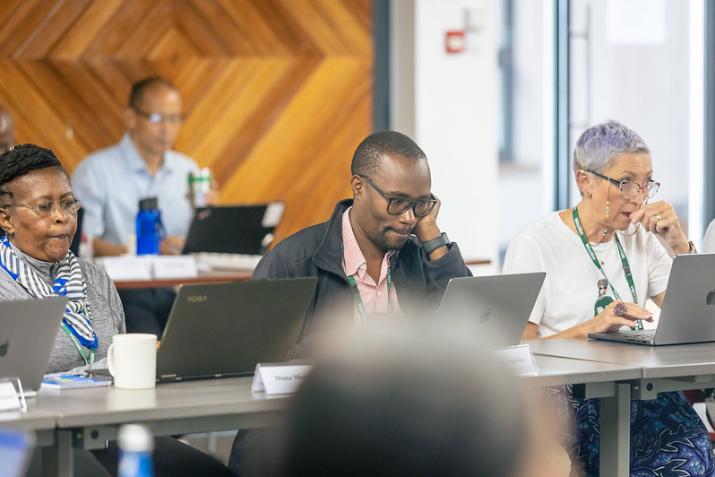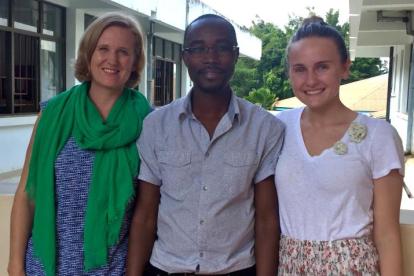
James Ngocho attends a meeting of DGHI's East African research partners at the University of Global Health Equity in Butaro, Rwanda. Photo by Olivier Habiyaremye/64 Waves
Published July 23, 2023, last updated on December 3, 2024 under Partnerships
When James Ngocho, M.D., Ph.D., was beginning his career in clinical research, he heard one thing often from his mentors: Don’t get discouraged.
“You have to be patient,” says Ngocho, a lecturer with the Kilimanjaro Christian Medical University College (KCMUCo) in Moshi, Tanzania. “It can take time to build the skills to compete for research grants, and I was lucky to have good mentors who gave me that advice.
In July, Ngocho’s patience paid off, as he became the first at KCMUCo, and just the third Tanzanian researcher, to earn an Emerging Global Leader grant (known as a K43) from the U.S. National Institutes of Health. Awarded by NIH’s Fogarty International Center, the highly competitive career-development grants provide critical early-career funding for young investigators in low- and middle-income countries. Ngocho will use the funds to lead research on ways to curb overuse of antibiotics in the treatment of respiratory infections in children under five.
But the award also marks a milestone for the Duke Global Health Institute, which has a long-running partnership with KCMUCo and its parent organization, the Kilimanjaro Christian Medical Centre (KCMC), to nurture promising young investigators such as Ngocho. An epidemiologist who has been working on DGHI projects in Moshi since 2013, Ngocho participated in a training program led by DGHI professor John Bartlett, M.D., to help junior faculty develop the skills to run their own research programs. It’s one of several NIH-funded training programs Bartlett has organized at KCMC over the past two decades.
“It’s a testament to the long arc of the partnership between Duke and KCMC,” says Matt Rubach, M.D., a DGHI associate professor and co-director of the Duke partnership with KCMC. “The goal is to help people like James become independent investigators, and this is an important step on that path.”

James Ngocho in 2016 with Melissa Watt,...
Ngocho gained experience conducting clinical research as a study coordinator for both Rubach and former DGHI professor Melissa Watt, Ph.D., now with the University of Utah. He also completed doctoral research with Blandina Mmbaga, M.D., Ph.D., the site leader for the KCMC-Duke partnership. The NIH award will allow Ngocho to build on those experiences while establishing his own turf as a researcher.
“He’s going to gain skills and a toolkit that none of his mentors has,” says Rubach, who with Mmbaga will advise Ngocho’s project.
With the five-year NIH grant, Ngocho will use biomarkers and clinical indicators to develop an algorithm that can help doctors determine the cause of childhood respiratory infections. While most respiratory infections in children are caused by viruses and tend to be mild, bacterial infections can be severe and may warrant the use of antibiotics. But when doctors don’t know the origin of an infection, many default to prescribing antibiotics out of caution, Ngocho notes. Such unnecessary use can accelerate antibiotic resistance.
Ngocho envisions a simple prediction model that could give doctors and patients assurance in cases where antibiotics are not needed. “If you don’t give them an alternative that is really convincing, we will struggle to reduce antibiotic use,” he says.
Building a career in research can be complicated in an under-resourced healthcare system like Tanzania’s, Ngocho says. “We don’t really have grants or seed money,” he notes. “Most research in Tanzania is being funded from outside, and it’s so difficult for a junior researcher to reach that level of being able to compete.” Many give up, opting instead for more stable incomes as practicing doctors.
Ngocho might have, too, were it not for the support and encouragement of people like Rubach, Watt, Mmbaga and Bartlett.
‘The one big thing I’ve had was the mentorship,” he says. “I think it shows that Duke and KCMC have done something that is really great. They are supporting us to develop the research skills we need to be mutual collaborators.”

